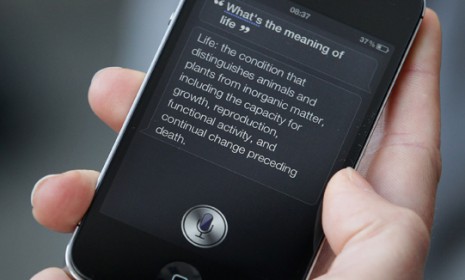After Siri: The ground-breaking future of virtual assistants
For many iPhone owners, Siri is revolutionary. But according to Norman Winarsky and Bill Mark at TechCrunch, we haven't seen anything yet

A free daily email with the biggest news stories of the day – and the best features from TheWeek.com
You are now subscribed
Your newsletter sign-up was successful
Siri, the iPhone 4S virtual helper that's redefining our expectations of handheld devices, is just "the tip of the iceberg," says Norman Winarsky and Bill Mark at TechCrunch. Siri's software, developed by Winarsky and Mark's company, takes natural language, applies context and reasoning, and pluckily spits out answers. But the next generation of virtual personal assistants (VPAs) will subtly learn your habits and behaviors with every query to become more competent and, invaluably, to establish trust. They'll be able to "maintain the context of the conversation for long periods of time, reason with clarity about what you discuss, provide answers to your questions, execute tasks for you, and all along the way learn from you and noticeably improve with use." What might that sound like? Here, Winarsky and Mark imagine a "natural, real, and helpful" conversation between a typical user Lisa and her futuristic VPA Nina:
Lisa: "Nina, I need a new purse."
Nina: "Great! Do you want to buy something from Michael Kors like you did last time?"
The Week
Escape your echo chamber. Get the facts behind the news, plus analysis from multiple perspectives.

Sign up for The Week's Free Newsletters
From our morning news briefing to a weekly Good News Newsletter, get the best of The Week delivered directly to your inbox.
From our morning news briefing to a weekly Good News Newsletter, get the best of The Week delivered directly to your inbox.
Lisa: "Well, I'd like Michael Kors, but I don't want to spend more than $400."
Nina: "Last time you bought your Michael Kors purse from Nordstrom. Nordstrom has a Michael Kors sale right now…here are some purses you might like."
Lisa: "I like the chocolate brown one, at $329. Is that the best price you found?"
Nina: "I saw a couple of offers at $310 from other retailers, but their return policy isn't as generous as Nordstrom's."
A free daily email with the biggest news stories of the day – and the best features from TheWeek.com
Lisa" "Okay, let's go with Nordstrom".
-
 How to Get to Heaven from Belfast: a ‘highly entertaining ride’
How to Get to Heaven from Belfast: a ‘highly entertaining ride’The Week Recommends Mystery-comedy from the creator of Derry Girls should be ‘your new binge-watch’
-
 The 8 best TV shows of the 1960s
The 8 best TV shows of the 1960sThe standout shows of this decade take viewers from outer space to the Wild West
-
 Microdramas are booming
Microdramas are boomingUnder the radar Scroll to watch a whole movie